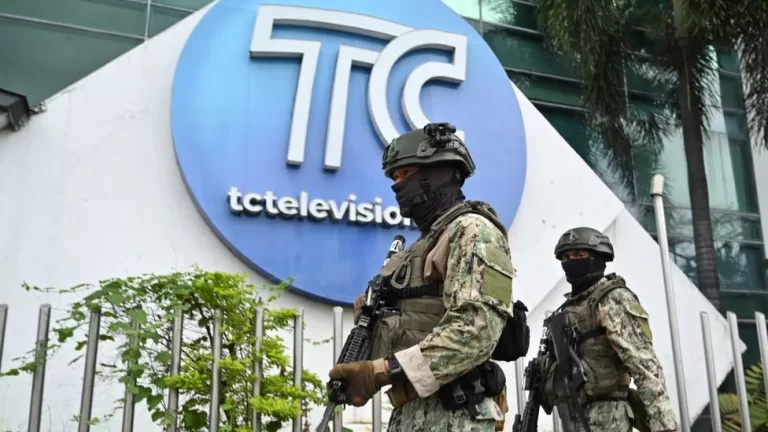Gradually, and with trepidation, life in Guayaquil is beginning to return.
Few residents have fully recovered from the shock – from the outright chaos and bloodshed – of this week, a moment which will live long in the city's collective memory.
But Dina Moreno can't afford to stay home any longer. She sells mobile phone accessories at Guayaquil's biggest covered market and, like many of her fellow stallholders, has ventured out to open her business and get back to work.
“I've never seen anything like it,” she recalls with a shudder. “When we saw what was happening at the TV station and we heard gunshots, everyone went crazy and started shutting up their shops and trying to get home.”
Behind her, as she talks, Dina's seven-year-old son plays with some mobile phone covers. Schools in the city remain closed after the explosion of gang violence. Such was her loss of income from two days with no sales, Dina had no choice but to bring him to work.
It's a similar story elsewhere in the sprawling market, as street food vendors, delivery boys and a preacher reciting Bible verses bring back the noise and bustle which has been absent since the attack.
The spectre of the drug-gang violence remains, though. One vendor, Jorge, told me that the stall owners were all watching out for each other under the market's huge white awnings, keeping an eye out for the first sign of more trouble or the return of armed men to the streets.
“I'm not scared of death,” he says, without a hint of bravado. “I just want to see peace return to my Ecuador.”
But while the small businesses of Guayaquil may be trying to get back to some form of normality, it's far from business as usual for Andres. His brother is among the 178 prison staff – most of them guards – still being held hostage by the gangs.
“The only information we've had is from the guards who managed to get out. They're the only ones who have told us that our relatives are OK,” he tells me from outside the Ambato prison, where he's spent hours waiting for news.

The police will only tell the desperate family members that they're waiting for orders to enter the prison. Andres says they haven't seen any movement from them in days. He adds that the guards had warned that something bad was going to happen in the prison, but the authorities didn't listen.
The government insists that the country is now engaged in a war with the gangs and cannot back down in the face of intimidation, from either inside or outside the prisons. “Hostage-taking is the ugly part of war,” President Daniel Noboa said this week.
That is of little comfort to Andres though, who accuses the government of negligence and of forgetting about his brother.
“I just hope they're not going to treat them as cannon-fodder,” he says.
Amid the chaos, the most brazen act of gang violence was in the TC television studio in Guayaquil when armed men took staff hostage, brandishing weapons at the journalists live on air.
In the ensuing ordeal, presenter Jose Luis Calderon could be seen urging the gang members to stay calm, even while they pointed a shotgun at his head and placed a stick of dynamite in his breast-pocket.
“I felt strangely calm even though I knew our lives were at risk,” he recalls when we met him afterwards. Jose Luis described how he hid in a bathroom with a several colleagues when they heard yelling and gunfire. But their hiding place was soon discovered, and they were hauled out to join the other staff on set, at gunpoint.
“They sent kids, armed to the teeth, to spread fear, uncertainty, anxiety and chaos,” he says. “They were there to send the message that they can just walk in and take over one of the biggest media outlets in the country.”
Hundreds of gang members have now been detained by the police. While the streets of Guayaquil are empty during the night-time curfew, by day they're getting busier as people come and go about their normal business.
As the days pass from the most terrifying experience in its modern history, it is beginning to look like Ecuador is returning to normality. The risk is that it is actually hurtling towards an entrenched armed conflict, and moving ever closer to becoming a full “narco-state”.
— CutC by bbc.com


